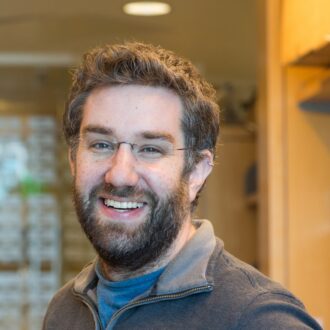James Fraser
Biophysicist Faculty Scientist
Professor of Bioengineering and Therapeutic Sciences, UC San Francisco
Recent Pubilcations
Related News
AI Technology Designs Novel Functional Enzyme
Molecular Biophysics and Integrated Bioimaging (MBIB) Division faculty scientists James Fraser and James Holton were part of a team that demonstrated that a natural language processing AI can design novel proteins that function as well as naturally occurring ones. This advance could energize the 50-year-old field of protein engineering by speeding the development of new proteins that can be used for almost anything from therapeutics to degrading plastic.
Building Blocks for COVID-19 Antiviral Drugs Identified in Rapid Study
Members of the UC San Francisco Quantitative Bioscience Institute Coronavirus Research Group (QCRG), in collaboration with Berkeley Lab and SLAC National Accelerator Laboratory (SLAC), have identified key chemical building blocks for an eventual antiviral drug against SARS-CoV-2, the virus that causes COVID-19. The newly identified compounds bind to an enzyme produced by the virus, called the “macro domain,” which is known to be crucial for the virus’s ability to replicate in human cells. The authors are writing up a formal manuscript describing the results for submission to a peer-reviewed academic journal, but also published their data directly online on July 1 to accelerate global efforts to fight the coronavirus pandemic.
NIH Awards $6.5 Million for Augmenting Structural Biology Research Experience
The National Institutes of Health (NIH) has awarded $6.5 million to Berkeley Lab to integrate existing synchrotron structural biology resources to better serve researchers. The grant will establish a center based at the Lab’s Advanced Light Source (ALS) called ALS-ENABLE that will guide users through the most appropriate routes for answering their specific biological questions.




